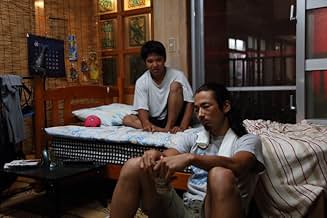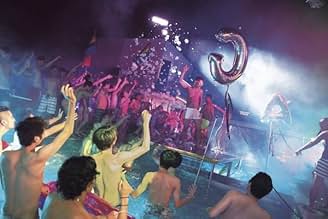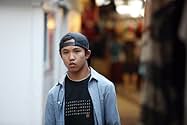IMDb RATING
7.0/10
3.6K
YOUR RATING
A grisly unsolved murder links three seemingly unrelated stories in three different Japanese cities.A grisly unsolved murder links three seemingly unrelated stories in three different Japanese cities.A grisly unsolved murder links three seemingly unrelated stories in three different Japanese cities.
- Awards
- 4 wins & 21 nominations total
Featured reviews
Trust is an eternal topic of debate. Kotaro Isaka's "Golden Dreamland" tells a story about using "trust" as a weapon, and this story tells you that one cannot trust another person forever.
The acting skills of the actors are really amazing! The movie clip is slightly messy.
Even without the vices of lust for money, hate, envy, human beings can be such miserable creatures. This is a heart wrenching drama set in beautiful locations and beautifully acted.
It's a take on the psyche of simple people, when faced with adversity, sometime even not directed at them. It's about love, rage, helplessness, faith, trust and beliefs and how sometimes they get the better of us.
Films like Se7en, Crash come to mind in terms of the effect it leaves behind. And like those films probably I wont muster the desire to watch it again, but I am glad I saw it.
It's a take on the psyche of simple people, when faced with adversity, sometime even not directed at them. It's about love, rage, helplessness, faith, trust and beliefs and how sometimes they get the better of us.
Films like Se7en, Crash come to mind in terms of the effect it leaves behind. And like those films probably I wont muster the desire to watch it again, but I am glad I saw it.
RAGE is the second attempt of Lee Sang-il, a Japanese filmmaker of Korean extraction, at adapting Shûichi Yoshida's popular novels, the first being VILLAIN (2010), a critical succès d'estime, both films ostensibly inspect the malaise of a contemporary society built upon a lurid murder case.
A couple is cold-bloodedly liquidated in their home, one year later, three strands (taking place in Chiba, Tokyo, and Okinawa respectively) of narratives are cogently intersected when the police corroborate that the suspect has undergone a facelift and is on the lam, all three story lines will be boiled down to a disintegration between the initially unsuspected and the possible perpetrator, and at the same time, the film meticulously keeps dangling audience with its ever-rotating guessing game.
In Chiba, a girl Aiko (Miyazaki) sloughed from a demimonde background by her father Yohei (Watanabe), strikes a relationship with Tetsuya (Matsuyama), a reticent young man with his past concealed; in Tokyo, a self-dependent gay man Yuma (Tsumabuki), lays his eyes on a reedy Naoto (Ayano) in his usual cruising haunt, after their first penetration, Yuma invites a homeless Naoto to live with him, but the latter remains unforthcoming to a fault; in Okinawa, drifter Shingo Tanaka (Moriyama) is hidden on a small island, after chancing upon a newly-arrived young girl Izumi (Hirose) and a local boy Tatsuya (Sakumoto), their fate will go through shifting sands when an unfortunate tragedy occurs.
Thus, Lee plies audience with 3 candidates of the murderer: Tetsuya, Naoto and Shingo, and cunningly teases viewers with alternate possibilities by dint of coalescing these three's attributes into one photoshopped end product (only one revealing shot in the elevator brazenly belies the eventually misled whodunit), actually, the film is not so much a police procedural as a carefully designed weepie gauging the tenuous degree of trust among human interactions, at least in the paralleled stories of Chiba and Tokyo, the issue of trusting the one you love in spite of his carapace hammers home in a treacly manner albeit two terrific performances from Miyazaki and Tsumabuki, the former blends convincingly her unadulterated immaturity with searing vulnerability whereas the latter, palpably inputs something warm, sympathetic and enthralling to flesh out a character very easily teetering on the brink of homosexual platitude. On the other hand, a transcendent Moriyama steals the limelight in the Okinawa chapter, where the film thrusts its "rage" mythos to the fore and reveals something rotten entrenched within (a slap to both islanders and foreigners), but newcomer Takara Sakumoto is unfortunate shy of charisma to match his rival here.
As a matter of fact, acting is the movie's strongest suit because the script itself takes liberty with many wanton coincidences and artistic license to facilitate plot progress, for example, is it really necessary to bluntly play up certain characters' taciturnity as if this is the only way to keep audience hooked without spilling the beans? Also, for my money, the movie errs on the side of being mawkish and blasé, other than taking its aim at a more rapier-like appraisal of its intriguing premise (cause of the crime), Lee's film is awash with sizzling emotions (cheek by jowl with Ryuichi Sakamoto's attendant score) but in the end of the day, it doesn't reach the echelon of superiority as far as the ultimate impact is concerned.
A couple is cold-bloodedly liquidated in their home, one year later, three strands (taking place in Chiba, Tokyo, and Okinawa respectively) of narratives are cogently intersected when the police corroborate that the suspect has undergone a facelift and is on the lam, all three story lines will be boiled down to a disintegration between the initially unsuspected and the possible perpetrator, and at the same time, the film meticulously keeps dangling audience with its ever-rotating guessing game.
In Chiba, a girl Aiko (Miyazaki) sloughed from a demimonde background by her father Yohei (Watanabe), strikes a relationship with Tetsuya (Matsuyama), a reticent young man with his past concealed; in Tokyo, a self-dependent gay man Yuma (Tsumabuki), lays his eyes on a reedy Naoto (Ayano) in his usual cruising haunt, after their first penetration, Yuma invites a homeless Naoto to live with him, but the latter remains unforthcoming to a fault; in Okinawa, drifter Shingo Tanaka (Moriyama) is hidden on a small island, after chancing upon a newly-arrived young girl Izumi (Hirose) and a local boy Tatsuya (Sakumoto), their fate will go through shifting sands when an unfortunate tragedy occurs.
Thus, Lee plies audience with 3 candidates of the murderer: Tetsuya, Naoto and Shingo, and cunningly teases viewers with alternate possibilities by dint of coalescing these three's attributes into one photoshopped end product (only one revealing shot in the elevator brazenly belies the eventually misled whodunit), actually, the film is not so much a police procedural as a carefully designed weepie gauging the tenuous degree of trust among human interactions, at least in the paralleled stories of Chiba and Tokyo, the issue of trusting the one you love in spite of his carapace hammers home in a treacly manner albeit two terrific performances from Miyazaki and Tsumabuki, the former blends convincingly her unadulterated immaturity with searing vulnerability whereas the latter, palpably inputs something warm, sympathetic and enthralling to flesh out a character very easily teetering on the brink of homosexual platitude. On the other hand, a transcendent Moriyama steals the limelight in the Okinawa chapter, where the film thrusts its "rage" mythos to the fore and reveals something rotten entrenched within (a slap to both islanders and foreigners), but newcomer Takara Sakumoto is unfortunate shy of charisma to match his rival here.
As a matter of fact, acting is the movie's strongest suit because the script itself takes liberty with many wanton coincidences and artistic license to facilitate plot progress, for example, is it really necessary to bluntly play up certain characters' taciturnity as if this is the only way to keep audience hooked without spilling the beans? Also, for my money, the movie errs on the side of being mawkish and blasé, other than taking its aim at a more rapier-like appraisal of its intriguing premise (cause of the crime), Lee's film is awash with sizzling emotions (cheek by jowl with Ryuichi Sakamoto's attendant score) but in the end of the day, it doesn't reach the echelon of superiority as far as the ultimate impact is concerned.
Rage (Ikari) is a Japanese suspense mystery drama film directed by Lee Sang-il and based on Shuichi Yoshida's mystery novel, following the same creative partnership behind their recent highly anticipated film Kokuho (National Treasure).
The film weaves together parallel narratives - the hunt for a murderer across three locations and the intimate examination of trust and human connection - creating a complex exploration of both mystery and the fragility of human relationships.
"The request was for one theme, one motivational motif that would start out sounding like 'distrust' and gradually transform into 'trust' as the film progressed," says Sakamoto.
"What the director most wanted to explore was this human dynamic between distrust and trust - whether some form of love could emerge from that tension. It seems that's where his focus was."
Through many exchanges with the director and his persistent creative demands, Sakamoto crafted music that masterfully captures the complex emotional depths of modern humanity.
The melody repeats the same phrase while evolving gradually, enveloping the anger and grief that live within the film and transforming it into beautiful music.
"This time, I went to Seattle to record the live string parts with the same musicians who played on 'The Revenant.' We got a really good sound and great performances.
For 'Rage,' while it has elements similar to 'The Revenant,' I tried to create something with a broader range of listening possibilities.
Since I have this work, I want to go up the stairs one by one, even if they're small steps, so that's how I approach it.
Review written by artist jayakumar.
The film weaves together parallel narratives - the hunt for a murderer across three locations and the intimate examination of trust and human connection - creating a complex exploration of both mystery and the fragility of human relationships.
"The request was for one theme, one motivational motif that would start out sounding like 'distrust' and gradually transform into 'trust' as the film progressed," says Sakamoto.
"What the director most wanted to explore was this human dynamic between distrust and trust - whether some form of love could emerge from that tension. It seems that's where his focus was."
Through many exchanges with the director and his persistent creative demands, Sakamoto crafted music that masterfully captures the complex emotional depths of modern humanity.
The melody repeats the same phrase while evolving gradually, enveloping the anger and grief that live within the film and transforming it into beautiful music.
"This time, I went to Seattle to record the live string parts with the same musicians who played on 'The Revenant.' We got a really good sound and great performances.
For 'Rage,' while it has elements similar to 'The Revenant,' I tried to create something with a broader range of listening possibilities.
Since I have this work, I want to go up the stairs one by one, even if they're small steps, so that's how I approach it.
Review written by artist jayakumar.
Saw this film at TIFF (Toronto International Film Festival) yesterday. It is a somewhat lengthy Japanese film (2+ hrs) with strong acting and interesting storyline. Most films covering similar topics--unsolved crime, mysterious loner, young lovers, homosexual relationship--would have ended up clichéd and boring after an hour but this film definitely kept me interested throughout.
Unfortunately, I feel the ending weakens the film. The way the crime details were revealed at the end seemed rushed and wasn't as imaginative as the rest of film. Overall, a good film worth watching if you are looking for a foreign film with crime drama plot.
Unfortunately, I feel the ending weakens the film. The way the crime details were revealed at the end seemed rushed and wasn't as imaginative as the rest of film. Overall, a good film worth watching if you are looking for a foreign film with crime drama plot.
Did you know
- SoundtracksM21 Forgiveness
Written by Ryuichi Sakamoto
Performed by Ryuichi Sakamoto feat. 2Cellos
Courtesy of Sony Music Japan International
- How long is Rage?Powered by Alexa
Details
Box office
- Gross worldwide
- $13,521,593
- Runtime2 hours 22 minutes
- Color
- Sound mix
- Aspect ratio
- 2.35 : 1
Contribute to this page
Suggest an edit or add missing content





























